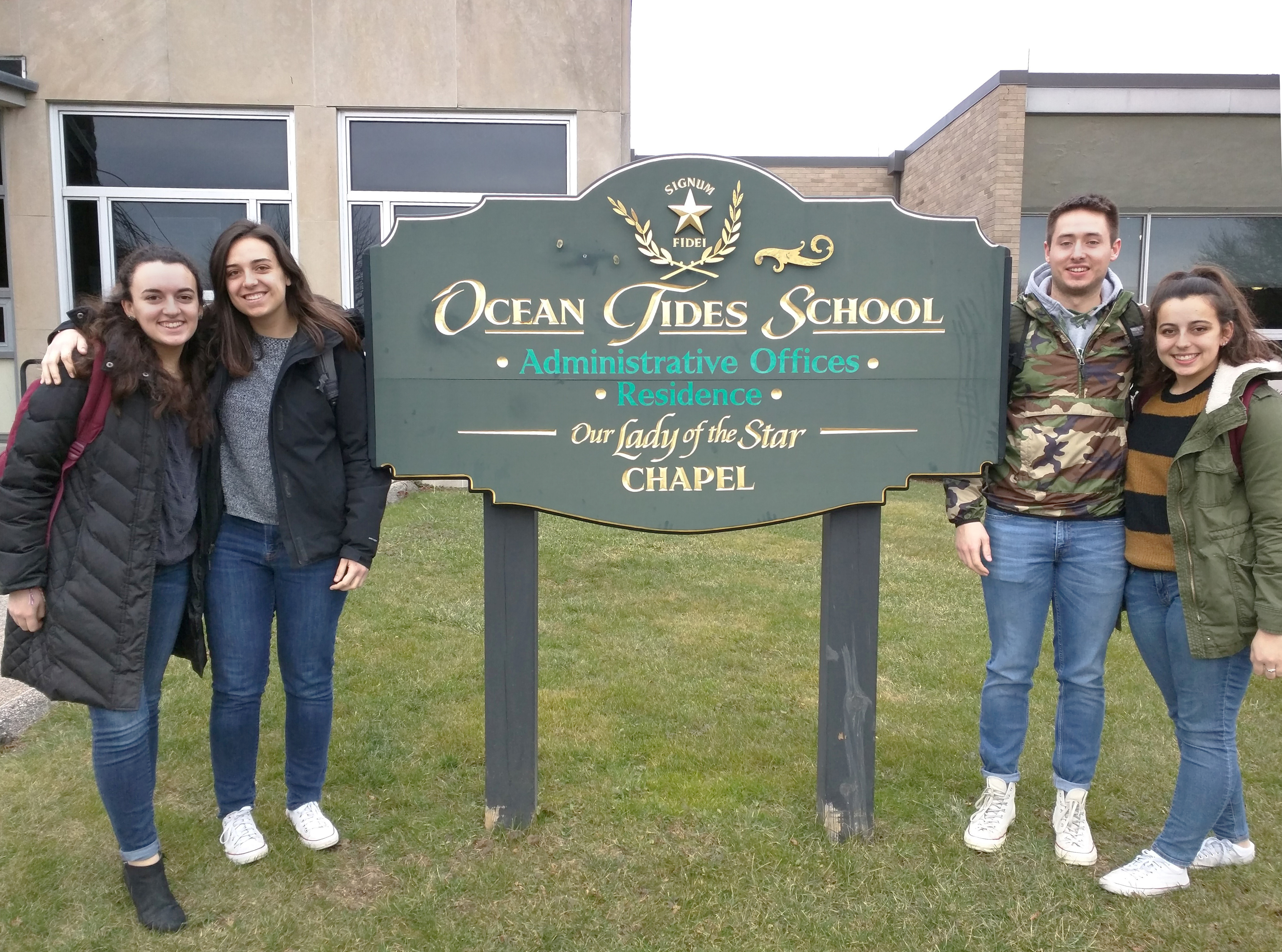(Left to right) Justine Gomes, Shannon Racz, Thomas Mowry, and Carolyn Conti visit Ocean Tides School as part of the J-term Criminal Justice Program. Photo courtesy of Judy Van Wyk.
This past winter break, nine University of Rhode Island students accompanied a professor in visiting Ocean Tides Inc. and Tides Family Services to learn more about the juvenile justice system in Rhode Island.
Dr. Judy Van Wyk, an associate professor in the department of sociology and anthropology, was the professor for the students’ J-Term course.
In September, Van Wyk held an information session about the program for the various departments that make up the interdisciplinary criminal justice major. Political science, sociology, economics and psychology were the departments she invited. However, students in every major were eligible to apply.
Students interested in joining the program were required to fill out an application. The application consisted of an essay describing how students felt they could benefit from the program, accompanied by their current grade point average. Van Wyk chose the top ten candidates she felt would benefit from the program the most.
“This is a non-traditional way to be educated,” said Van Wyk. “You’re dropped into a different world, it’s not something you can experience in a classroom.”
Ocean Tides is a private organization in Rhode Island which has helped the Department of Children and Youth Families with their course load of social services for the past thirty years. When a high school in Rhode Island notices that a student is missing school days or getting into minor trouble, they will ask Ocean Tides Family Services to step in. The service will make regular check-ups with the students and their families to make sure they receive the education and attention they need.
When a minor is convicted of a juvenile offense, a judge has the option to allow the minor to do their time somewhere other than a youth prison. Ocean Tides Inc. could be this alternative. Ocean Tides functions as both a high school and an in-house residential treatment training facility.
The facility is heavily supervised and time is highly structured. It provides students with the necessary treatment training including drug counseling, anger management training, family contact and counseling.
“Anytime we have the opportunity to put a kid in a community placement, instead of a locked facility like the training school, is ideal,” said Matthew Belke, a senior staff member for residential living at Ocean Tides Inc. “We used evidence-based practices here. A lot of issues that these kids are having stem from problems at home and substance abuse problems. That is one of our biggest programs here.”
At Ocean Tides, the students in the program read cases and made suggestions on how to help juveniles. Throughout the day, they socialized and shadowed the students in their classes. In addition, they shadowed teachers in the high school and discussed their duties at the facility.
At Tides Family Services, the group attended a lecture series about the theory of rehabilitation. Furthermore, they were given the opportunity to accompany social workers on their daily routines of visiting client’s homes to inquire about their attendance at school and their mental well-being.
Each night students in the program were required to write in their online journals, describing what they did and what they had learned that day. These journals were directed at Van Wyk and she used them as feedback. In addition, they participated in an online discussion with their fellow classmates describing their experiences.
At times students in the program got attached to some of the students they shadowed.
“The students get very attached to the kids just in two days, many students wrote in their journals that they were very upset when they didn’t get to say goodbye,” said Van Wyk. “Students will say things like ‘these are just normal kids’ or ‘why isn’t there a way to help these kids?’ ‘There is enough money in the world to fix so many of these problems,’ is another thing I hear. Students do get upset, but it does generate a lot of passion.”
On the last day of the program, the students in the program visited Family Court in Providence where they learned about the intake process from Kevin Richards, the intake director. The judge presiding over the court had authorized students to sit-in on closed hearings, a privileged not granted often. Later in the day, students were given a lecture series which described several different professions in the field of social work.
This experience not only educates students about the juvenile system in Rhode Island but also the wide array of career options in social work. Several of Van Wyk’s students have chosen a career path after attending this program.
“The program does generate new interests for students,” said Van Wyk. “I think it is a life changing experience. It is surprising how impactful it is.”

